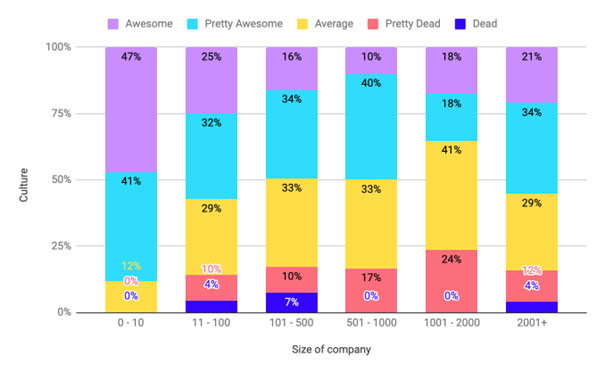Introduction
As a designer in the thriving tech industry, I’ve found myself standing at a crossroads several times throughout my career. One of the most critical decisions I’ve had to make was choosing between working for a small company or a big corporation. Both paths offered unique opportunities and challenges, and understanding the differences has significantly impacted my professional trajectory. In this blog article, I’ll take you on a personal journey, sharing my perspective on the contrasting experiences of working for The Cecily Group versus my previous employer and the factors that influenced my decision-making process.
Establishing the categorization
According to Commission Recommendation small and medium-sized enterprises (SMEs) are defined as companies that have staff numbers and economic weight below specific thresholds, specifically:
- A medium-sized company is characterized by having up to 250 employees, a turnover of up to €50 million, and a balance sheet total of up to €43 million.
- A small company is identified by having up to 50 employees and a turnover or balance sheet total of up to €10 million.
- A micro-company is distinguished by having up to 10 employees and a turnover or balance sheet total of up to €2 million.
In the European Union (EU), there are more than 23 million SMEs, constituting 99% of all businesses and contributing to two-thirds of private-sector employment. These enterprises play a vital role as a driving force behind the economy.
Company Culture and Work Environment
Working for a Small Company: When I joined The Cecily Group, I immediately noticed the intimate, close-knit atmosphere. The team is compact, and everyone knows each other well. This fosters a collaborative environment where I can easily interact with colleagues responsible for different departments. I appreciated the open communication and the flat hierarchy, as it allowed me to feel more involved in the company’s overall vision. Decisions are made quickly, and I have a say in shaping the projects I’m working on.
Working for a Big Corporation: At my previous company the work environment felt more formal, and navigating through layers of management to interact with other teams or departments took some getting used to. While the company offered more resources and opportunities for advancement, I found it challenging to have a significant impact on the company’s direction due to the scale of operations. Occasionally, dealing with corporate politics presented challenges in my job, particularly when I needed to coordinate projects across various departments.
According to Hi5’s research, smaller companies (0–10 employees) have a better culture than bigger ones: 47% of their employees claim they have an “Awesome” company culture, whilst ±35% of employees at larger corporations (11–1000 employees) rate their culture as “Pretty Awesome”. Company values play a crucial part in company culture, and at The Cecily Group, we put a great emphasis on knowing and practicing.

Scope of Responsibilities
Working for a Small Company: At The Cecily Group, I’m wearing many hats, in other words, I have a T-shaped role, which is both exciting and challenging. Apart from coding, I’m involved in various stages of the development process, from testing to debugging and even customer support. This broader scope of responsibilities provides me with a deeper understanding of the product lifecycle and allows me to gain diverse experiences.
Working for a Big Corporation: At my former job, my role was more specialized. I focused on a specific aspect of a project, which allowed me to develop in-depth expertise in that domain. However, I sometimes missed the broader responsibilities I had in the small company, as I didn’t get the chance to explore other areas of interest.
Impact and Recognition
Working for a Small Company: One of the most rewarding aspects of working for The Cecily Group is the visibility of my contributions. With fewer layers of bureaucracy, recognition for outstanding work is more immediate, and I felt a greater sense of ownership and pride in my accomplishments. My work directly impacts the success of the organization, and I feel like an integral part of the team.
Working for a Big Corporation: My previous workplace offered a broader platform for projects with significant global impact, and individual recognition required more effort. On the other hand, the benefits were more lucrative, and financial rewards could be given based on the team’s work instead of individual accomplishments.
Flexibility and Innovation
Working for a Small Company: The agility of The Cecily Group is exhilarating. Decisions are made swiftly, and there is room for experimentation with new technologies and approaches. The SME environment fosters innovation and creativity, and I appreciate the freedom to explore uncharted territories. We strive for excellence, but we also wish to operate in an upfront environment, and making mistakes and admitting to them is a part of this process. I’m also able to work flexible hours, spend less time on administration, and schedule my meetings with greater authority.
Working for a Big Corporation: My previous employer provided stability and well-established processes, but it also meant less room for experimentation, less room for mistakes, and more administrative tasks. However, they had the resources to invest in research and development, offering unique opportunities to work on cutting-edge projects with larger time frames and more support.
Conclusion
I’ve had the privilege of experiencing both the dynamic world of small companies and the structured landscape of big corporations. Each journey has shaped me as a designer in unique ways. The choice between working for a small company or a big corporation is a deeply personal one, and it should align with career goals, work preferences, and aspirations for professional growth. As I navigate the constantly changing tech industry, I am also gaining insight into my strengths and weaknesses. This has led me to a point where I now have a better understanding of my preferences.

